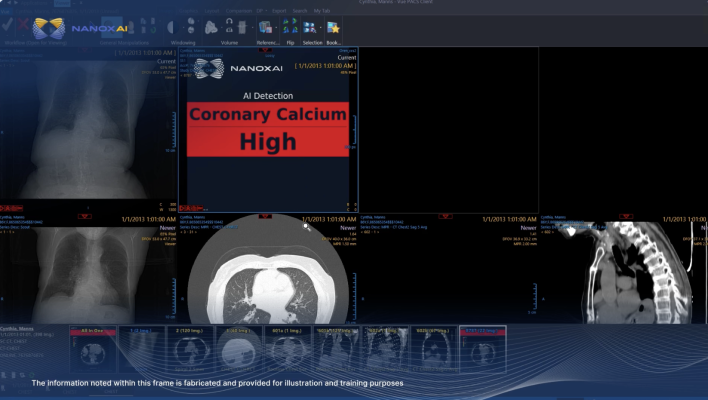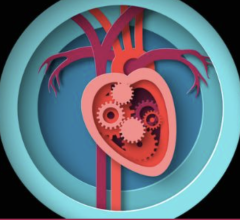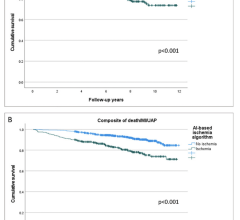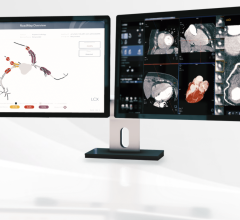
July 25, 2024 — Nanox, an innovative medical imaging technology company, announced that the AI Cardiac Solution (HealthCCSng) of its subsidiary, Nanox.AI Ltd., was highlighted in multiple scientific presentations at the 2024 Society of Cardiovascular Computed Tomography (SCCT) Annual Meeting.
“We are encouraged by the implementation of our AI cardiac solution at esteemed healthcare systems, along with the continued validation through real-world studies of its potential to promote early detection and preventive care of cardiovascular disease,” said Erez Meltzer, Nanox Chief Executive Officer and Acting Chairman. “We would also like to thank SCCT for the opportunity to showcase the outstanding clinical results of our AI cardiac solution.”
Findings presented at SCCT 2024 include:
Prevalence and Prognostic Implications of Incidentally Detected Coronary Artery Calcium Using Artificial Intelligence Analysis Among Individuals with Immune Mediated inflammatory Diseases
- Abstract Link (2024-A-817-SCCT)
- Lead author Brittany Weber, MD, PhD, declared as ‘Young Investigator Awards Winner’ at conference
- In a study conducted by Brigham & Women’s Hospital, HealthCCSng was used to analyze non-cardiac, non-gated chest CT scans of patients with different types of immune mediated inflammatory disease (IMID) – systemic lupus erythematosus, psoriasis, and rheumatoid arthritis – which are associated with increased risk of cardiovascular disease.
- The study demonstrates that Incidental Coronary Artery Calcification (CAC) on the CT scans of the IMID patients (identified and quantified by HealthCCSng), was found in over 50% of scanned patients and associated with all-cause mortality and adverse cardiovascular outcomes.
- According to the study, Given the limitations of traditional cardiovascular risk calculators among IMID patients, this data demonstrates the potential of AI-based CAC scoring to offer better guidance for preventative therapies for that patient population.
Optimizing Preventive Cardiology: Harnessing AI for Early Detection of Coronary Artery Disease
- Abstract Link (2024-A-573-SCCT)
- Corewell Health reported that in the first full year of implementing HealthCCSng in its electronic medical records (EMR) system, HealthCCSng analyzed 32,650 chest CT scans and helped identify 3,721 new patients with medium or high CAC – a thirteen-fold increase over the 268 patients reported in the previous two years.
- Corewell also reported decreased time to treatment, increased statin prescription rate, increased patient satisfaction with the actionable data concerning their cardiac risk, and improved patient compliance in treatment.
- This observational study demonstrated that the Nanox.AI algorithm is useful in the process of identifying patients with undiagnosed Coronary Artery Disease (CAD) and that AI integrated into the EMR can positively impact population health goals.
AI Empowering Early Detection of CAD Patients for Improved Cardiac Care
- Abstract Link (2024-A-641-SCCT)
- After being installed and implemented at Jefferson Einstein Hospital, HealthCCSng helped identify 757 patients aged 30 or above with CAC levels higher than 100 Agatston units.
- Of these 757 identified patients, 179 met eligibility criteria to be automatically flagged for follow-up consultation and treatment.
- Of these 179 eligible patients, 97 returned to Jefferson Einstein for visits totaling 308 total touchpoints.
- The above-mentioned touchpoints generated up to $130,000 in revenue for the hospital.
- This analysis shows both the clinical and economic effects of implementing an AI solution (HealthCCSng, Nanox.AI) to opportunistically screen large populations.
Artificial–Intelligence-based Detection of Coronary Artery Calcium on Chest CT to Enhance Cardiovascular Risk Assessment of Individuals with Elevated Lipoprotein (a)
- Abstract Link (2024-A-820-SCCT)
- In a study conducted by Massachusetts General Hospital and Brigham & Women’s Hospital, HealthCCSng was used to analyze non-contrast chest CT scans of 260 patients who had measurements of lipoprotein a (Lp(a)), as part of clinical care.
- A statistically significant correlation was found between levels of CAC and Lp(a) – a risk factor for coronary atherosclerosis – suggesting that this approach may be used to identify at-risk patients.
- Such an approach may be used to identify higher risk individuals and screen patients for future clinical trials.
Opportunistic Screening of Coronary Artery Calcification on Non-gated Conventional CT scans Using Artificial Intelligence
- Abstract Link (2024-A-532-SCCT)
- In a study conducted by Rabin Medical Center, HealthCCSng was used to analyze non-gated, non-contrast chest CT scans of 631 patients.
- 84 clinically relevant patients were classified as having high CAC levels and invited to a dedicated outpatient preventive cardiology clinic.
- 20 patients were referred to myocardial perfusion imaging and 2 were referred for invasive coronary angiography.
- This data suggests that AI-based CAC evaluation can help identify patients who may benefit from preventive cardiology services.
- Using HealthCCSng, Rabin Medical Center was able to identify new patients with severe CAC who were previously unknown to the health system and as a result, these patients were scheduled to visit the preventive cardiology clinic.
For more information: www.nanox.vision/ai


 July 23, 2024
July 23, 2024 









